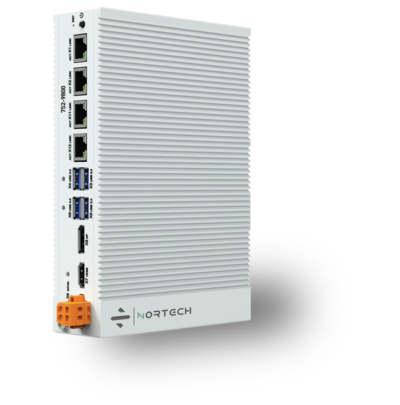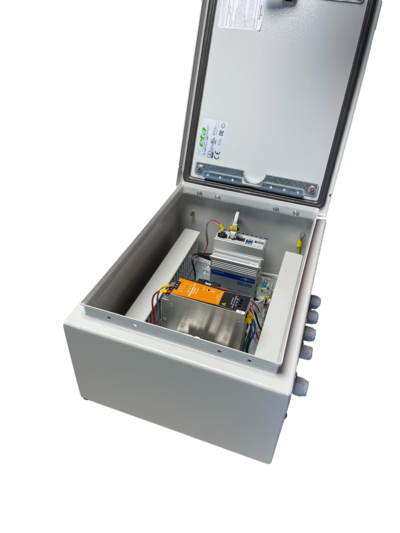Abbreviations
| Abbreviation | Description |
|---|---|
| AMS | Alarm and monitoring system |
| IAS | Integrated automation system |
| VM | Virtual Machine |
| VDC | Volt direct current |
| VLAN | Virtual Local Area Network |
| ECR | Engine control room |
References
Installation instructions
The purpose of these instructions is to provide a comprehensive guide for installing and activating Nortech’s data collection system. This document focuses on the general aspects of the installation process and is intended to be adaptable to various applications and environments.
Throughout this manual:
- “Edge device” refers to the computer or virtual machine (VM) where the Nortech’s data collection system is running.
- “Equipment” refers to the machinery or systems from which data is collected. This may include engines, pumps, integrated automation systems (IAS), alarm monitoring systems (AMS), drives, and more.
At the core of Nortech’s solution is a Docker-based software service, designed to run on any compatible Linux-based system.
Variants
Nortech’s data collection system is available in three configurations:
- Loose Parts: For integration into existing setups.
- Pre-Assembled Cabinet: A ready-to-install unit.
- Virtual Machine (VM): Software deployment on an existing IT infrastructure.
Each variant includes a core system and optional add-ons. The base system supports Ethernet-based communication and includes three Ethernet ports by default.
Loose parts
The following list represents the standard supply for Loose Parts configuration. However, we offer variations tailored to specific customer use cases. If you have particular requirements, please contact us for customization options.
Edge computer - standard supply
| Attribute | Specification |
|---|---|
| Operating system | Debian Linux |
| CPU | Intel Atom® E3845 - Quad Core 1.91 GHz |
| Memory | 8192 MB, DDR3L |
| Storage | 64 GB, mSATA SSD |
| Ethernet | 2x RJ45 (10/100/1000 Mbps) - X1: DHCP / Configurable - X2: 192.168.2.17 / Configurable |
| USB | 3x USB 2.0 1x USB 3.0 |

5 port network switch - standard supply
- Ethernet: 10/100 Mbps
- RST Support: Yes
- Managed: No
24VDC/DC power supply
- Voltage: 24V
- Curent: 5A
Electric breaker
- 2P, 6A, C
Pre-Assembled Cabinet
Standard Cabinet supply
| Attribute | Specification |
|---|---|
| Dimensions (W x H x D) | 400 x 300 x 200 [mm] |
| Weight [kg] | 10.6 |
| Casing material | DC01 sheet steel |
| Door | DC01 sheet steel |
| Mounting plate | Sendzimir sheet steel |
| Cable closing flange | DC01 sheet steel with two-component polyurethane foam gasket |
| Lockable | Yes |
| Mounting options | Wall mounted on brackets. |
| IP protection degree | IP66 |
| Included | All loose parts |

All Loose parts components are included in the cabinet delivery.
Virtual Machine (VM)
Minimum requirements
| Component | Specification |
|---|---|
| OS | Debian Linux LTS (Currently Debian 11 Bullseye) |
| Memory | 8GB RAM |
| CPU | 2 cores |
| Storage | 64GB |
| Network | - Routable path to internet (according to requirements) - Routable path or direct connection to equipment |
| Services | - Docker - SSH server |
Add-ons
Managed switch
Managed switches are available for use cases requiring network segregation. If included in the delivery, the switch will be pre-configured according to the customer’s specifications. VLAN technology is utilized to ensure secure and efficient network segmentation.
Media gateways
These provide additional interfaces tailored to the specific requirements of the installation. By default, the system supports Ethernet-enabled equipment and can collect data from any device connected to the same network or a routable network linked to the data collection unit.
For equipment on segregated Ethernet networks or using different field bus protocols, media gateways are employed to transfer data to the data collection unit. These gateways are delivered pre-configured to match the specifications of the equipment from which they will capture data.
Installation
Loose Parts Installation
Before installation, identify an appropriate location. The loose parts configuration is designed for closer integration and is intended to be mounted on DIN rails. This more streamlined approach is particularly well-suited for retrofitting or expanding existing systems.
Preparation
- Identify or install a suitable DIN rail with sufficient space for the loose parts in close proximity to:
- Redundant 24V DC power supply
- RJ45 socket with an active internet connection
- Equipment connection points
Mounting
- Secure components (edge computer, power supply, network switch) onto DIN rails.
- Ensure proper cable routing and maintenance access, following the provided layout.
- Verify that all components are firmly mounted to prevent vibrations or movement.
Environmental Considerations
- Maximum temperature: 45°C
- Recommended: Climate-controlled room (e.g., Engine Control Room, instrument room)
- Avoid excessive dust, moisture, or vibrations
Power and Network Connections
- Connect to a 24V DC power source, ensuring correct polarity and grounding.
- Route Ethernet cables through cable glands and connect to the RJ45 socket.
- Verify internet connectivity; the system defaults to DHCP but allows static IP configuration.
- Default DNS: Google (8.8.8.8, 8.8.4.4). If unavailable, provide a reliable alternative.
Equipment Connections
- Use the provided interface cables or media gateways for data collection.
- Secure all connections and verify system compatibility.
Final Checks
- Inspect all cables and connections for proper routing and secure attachment.
- Inspect cables and connectors for any strain to avoid damage.
- Verify that all components are accessible for future maintenance.
Post-Installation
- Once the installation is complete, proceed with commissioning. Use the pre-commissioning checklist to ensure all requirements are met before activating the system.
Post-Installation
- Once all connections are complete, the system is ready for commissioning. Follow the Pre-commissioning checklist before activation.
- Once network connectivity is verified, Nortech will initiate Remote Provisioning:
- Installs/configures required software.
- Retrieves Edge Device configurations.
- Begins data capture
- Ensures successful activation.
Pre-Assembled Cabinet Installation
Preparation
- Choose a location near:
- A redundant power supply (24V DC, regulated)
- An RJ45 socket with active internet connection
- Monitored equipment connection points
- Ensure space for:
- Cabinet dimensions
- Cable routing access, usually at the equipment’s bottom
Mounting
- Use the provided brackets for wall-mounting on a stable, flat, vibration-free surface.
- Ensure the cabinet is level and securely attached, allowing no movement.
Environmental Considerations
- Maximum operating temperature: 55°C
- Recommended installation: Climate-controlled rooms (e.g., Engine Control Room, instrument room)
- Avoid excessive dust, moisture, or vibrations
Power and Network Connections
- Connect to a 24V DC power source, ensuring correct polarity and grounding.
- Route Ethernet cables through cable glands and connect to the RJ45 socket.
- Verify internet connectivity; the system defaults to DHCP but allows static IP configuration.
- Default DNS: Google (8.8.8.8, 8.8.4.4). If unavailable, provide a reliable alternative.
Equipment Connections
- Use the provided interface cables or media gateways for data collection.
- Secure all connections and verify system compatibility.
Final Checks
- Inspect all cables and connections for proper routing and secure attachment.
- Inspect cables and connectors for any strain to avoid damage.
- Ensure the cabinet door is locked for security.
Post-Installation
- Once all connections are complete, the system is ready for commissioning. Follow the Pre-commissioning checklist before activation.
- Once network connectivity is verified, Nortech will initiate Remote Provisioning:
- Installs/configures required software.
- Retrieves Edge Device configurations.
- Begins data capture
- Ensures successful activation.
Virtual Machine Installation
In constrained environments, or environments where there are already existing IT infrastructure, it is possible to run Nortech’s data collection system in a Virtual Machine. Customers are responsible for ensuring their hardware meets Nortech’s minimum VM requirements and provides a stable environment for operation.
Preparation
- Set up a Virtual Machine (VM) that meets the specified requirements.
- Ensure an SSH server (e.g., OpenSSH) is installed and activated to allow secure remote access.
- The VM must have a routable connection to the equipment being monitored and to a working internet connection.
Environmental Considerations
- Since no physical installation is required, ensure the VM host server is in a stable and secure environment.
- The hosting infrastructure should be reliable and capable of maintaining uptime for uninterrupted data capture.
Network and Connectivity
- Verify the VM is accessible to Nortech engineers for remote provisioning via:
- A VPN tunnel or equivalent secure connection.
- Direct internet access with appropriate firewall rules allowing outbound traffic.
- Ensure the VM has a valid IP address and can reach the equipment and Nortech’s endpoints according to Nortech’s connectivity and bandwidth requirements.
Authentication
- Nortech will provide a public SSH key for authentication.
- Add the key to the VM’s authorized_keys file under the root user prior to provisioning.
- Ensure the root user is enabled and available, as the system requires root privileges to access raw sockets for data capture.
Remote Provisioning
- Once network connectivity is verified, Nortech will initiate the remote provisioning process.
- Remote provisioning is an automated, supervised procedure that:
- Installs and configures all required software components.
- Pulls necessary configurations for the VM to communicate with the equipment and begin data capture.
- Nortech will monitor the process to ensure successful activation.
Final Checks
- Verify the VM is functioning correctly and capturing data from the equipment.
- Ensure all connections to the equipment and Nortech systems are stable and operational.
- Confirm ongoing remote management capabilities are enabled for future updates and support.
Post-Installation
- Once provisioning is complete, the system is ready for use. Nortech engineers will provide guidance on next steps, including monitoring and data validation.
Connecting a USB-tether
Sometimes a Nortech box will need work from a Nortech Engineer. When there is no internet available, using an USB-tether can be used as a replacement. For connecting a USB-tether please follow these steps:
- Disconnect all cables from the Nortech EDGE.
- Power off the device
- Connect the USB cable to any of the free ports on the device.
- Power on the device
- Contact your Nortech contact to verify the device is online (customer portal)
- After the connection is established, you can reconnect any wires back to the Nortech EDGE. Preferably connect X2 first, wait for verification from your engineer that everything on that network is found, and then connect X1 back.